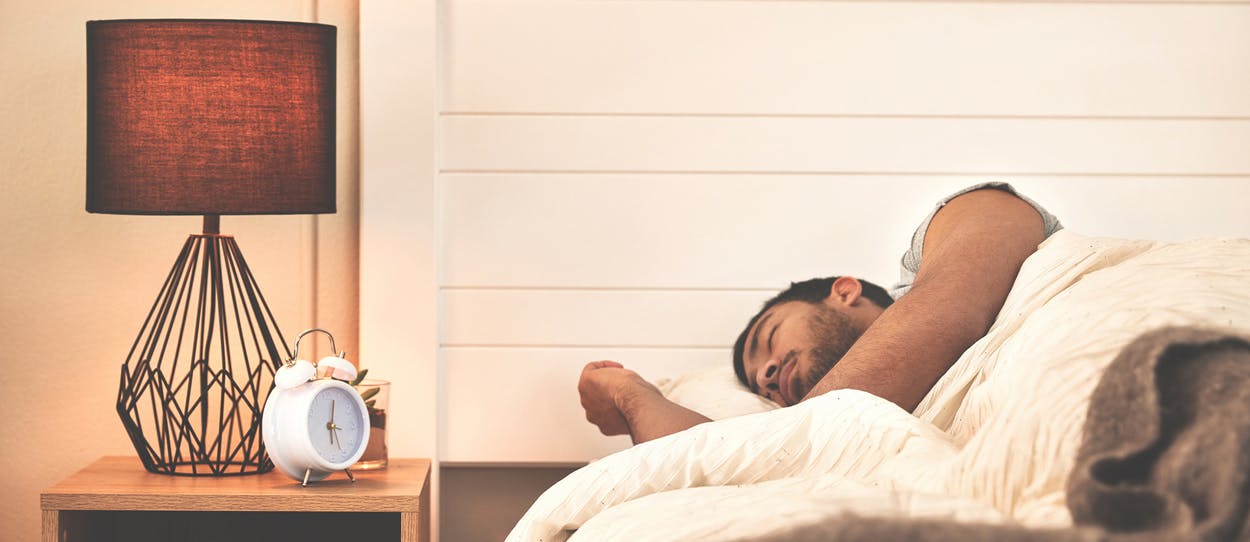
- Health hub/
- Stress relief & sleep support/
- Sleep: Importance & Different Sleep Stages


We have all heard the advice to “Get some good sleep” and this is for good reason. Sleep is one of the pillars of health, along with exercise and nutrition, and it is an essential biological function for living. The basis of ensuring we get enough sleep is that during sleep, many important processes occur.
For the body, sleeping can help with repair and recovery, including any injuries. It also helps to conserve energy, as the Cleveland Clinic explains, so that cells can resupply and stock up for the next day. For the mind, sleep helps to consolidate memories, improve mood and aid learning. During sleep, the brain reorganises and files memories and information from the day to support learning and memory.
Understanding this can help us understand the consequences of having a poor or insufficient amount of sleep. In addition, the obvious symptoms of tiredness and lack of sleep can negatively affect our immune response and our alertness. It can show up as daytime sleepiness, an increase in mistakes, poor concentration and memory, mood swings and irritability.
This can be detrimental not only on an individual level but also on a societal one. Poor attention can lead to lower productivity levels, irritability can lead to relationship issues, and lack of concentration can even mean dangers such as motor vehicle accidents or in occupations where public safety is involved.
As sleep also affects hormones that regulate appetite, sleep loss can lead to an increased appetite.
What is sleep?
Sleep is a process during which the body rests and repairs, and when the brain is less active, as are other physiological functions such as body temperature, heart rate and breathing. According to South Australia Health, we are in a state of reduced consciousness, but one in which we can be easily wakened.
Our sleep is driven by two interacting systems. Firstly, our homeostatic drive for sleep ensures that when we have been awake for a long period, we then feel sleepy and that we sleep long enough to balance against the time we are awake.
Secondly, our body clock or circadian rhythm also controls our sleep. Our circadian rhythms are synchronised with the light and darkness over the 24 hour cycle. So, when it is dark, this tells the body to start unwinding to sleep.
Stages of sleep
There are four stages of sleep we go through, which forms a full cycle. During a night of sleep, we go through four to six of these sleep cycles, which last about 90 minutes. You may wake briefly between cycles.
In one cycle of sleep, there are four stages, and these consist of two phases of sleep: non-REM and REM sleep. The difference between the two phases is that the first phase, non-REM sleep, is when our brain is quieter and slows down, while REM sleep is when the mind can be very active and when dreaming occurs.
Three stages of non-REM sleep
The first three stages of sleep are non-REM Sleep.Stage one: Falling Asleep
This stage lasts only a few minutes and occurs as you just start to close your eyes and start to fall asleep. During this process, the brain and body activity slow down, body temperature begins to drop, muscles relax, and you can be easily woken. Most people go through this stage several times each night.
Stage two: Light Sleep
This is when breathing and heart rate slow down, and according to World Sleep Society, it is when the brain goes through processes of memory formation and consolidation. This stage takes up to half of total sleep time.
Stage three: Deep Sleep
In this stage of deep or slow wave sleep, it can be hard to wake up from as many of the body’s physiological functions, such as brainwaves, muscle tone, heart rate and breathing rate slows down. This is a stage of restoration for the body, and when processes occur that support such functions as the immune system, memory and creativity. According to World Sleep Society, this stage usually takes place in the first part of the night.
REM Sleep Stages
Stage four: REM Sleep
This stage is when we enter REM sleep, or rapid eye movement (REM), as the eyes move rapidly, even with the eyes closed. This stage takes up about 20-25% of the night’s sleep. Here, brain activity starts to increase again and this is when dreams can be particularly vivid.
During this stage, the body enters a state of temporary paralysis, also called “atonia”, while the breathing and eye muscles stay active. Body temperature regulation doesn’t happen during this stage, according to World Sleep Society.
This stage gets longer as the night goes on until, by the end of the night, it’s likely it will be closer to an hour. This is considered the most important stage of sleep when restorative and repair processes occur.
These four stages complete the 90-minute sleep cycle before it repeats this cycle about three or four more times.
How REM and NREM stages work together
All these sleep stages are necessary and they work together to accomplish different tasks during the night, as World Sleep Society reports. It is the alternation of stages that is important for rebuilding, repairing and processes such as memory consolidation to occur.
The stages may not always go in the same order either. It’s possible to go from stage two directly to REM sleep, skipping stage three of deep sleep.
REFERENCES
https://healthiersleepmag.com/consequences-of-poor-sleep-quality/




